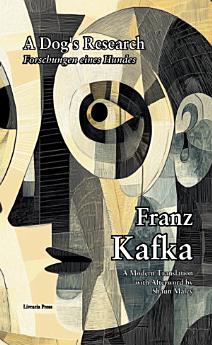A Dog's Research
The Complete Works of Franz Kafka წიგნი 26 · Continental Press
ელწიგნი
128
გვერდი
family_home
მისაღები
info
reportრეიტინგები და მიმოხილვები დაუდასტურებელია შეიტყვეთ მეტი
ამ ელწიგნის შესახებ
This has been translated as "Investigations of a Dog" or "Researches of a Dog" and other variations. The original German title was "Forschungen eines Hundes". In the narrative tradition of Voltaire in works such as "Micromégas" (1752), Kafka's story is narrated by a dog who reflects on his life and engages in an obsessive investigation of the mysterious forces governing his world, particularly focusing on the nature of sustenance and survival. The dog questions why food appears as if by magic and struggles to comprehend the rituals and behaviors of other dogs. His inquiries, however, are fraught with frustration, as he is unable to find satisfactory answers, leading to an ongoing sense of existential confusion. "A Dog's Research" can be read as a satirical and philosophical commentary on the limits of human understanding and the search for meaning, just like Voltaire's comedic-philosophic works. The dogs futile quest for knowledge mirrors the human condition, where ultimate truths often remain elusive despite relentless effort. The storys tone, blending humor with melancholy, underscores the tension between curiosity and the inherent limitations of perception. Kafkas use of the dog as a narrator allows him to examine human behaviors and social structures from an outsiders perspective, making this story a profound meditation on existence and the pursuit of knowledge.
ავტორის შესახებ
A Bohemian novelist and short-story writer, Kafka's work, which fuses elements of realism and the fantastic, typically features isolated protagonists facing bizarre or surrealistic predicaments and incomprehensible socio-bureaucratic powers. His writings, such as "The Metamorphosis" and "The Trial," explore themes of alienation, existential anxiety, and guilt, and are influential in modernist literature.
შეაფასეთ ეს ელწიგნი
გვითხარით თქვენი აზრი.
ინფორმაცია წაკითხვასთან დაკავშირებით
სმარტფონები და ტაბლეტები
დააინსტალირეთ Google Play Books აპი Android და iPad/iPhone მოწყობილობებისთვის. ის ავტომატურად განახორციელებს სინქრონიზაციას თქვენს ანგარიშთან და საშუალებას მოგცემთ, წაიკითხოთ სასურველი კონტენტი ნებისმიერ ადგილას, როგორც ონლაინ, ისე ხაზგარეშე რეჟიმში.
ლეპტოპები და კომპიუტერები
Google Play-ში შეძენილი აუდიოწიგნების მოსმენა თქვენი კომპიუტერის ვებ-ბრაუზერის გამოყენებით შეგიძლიათ.
ელწამკითხველები და სხვა მოწყობილობები
ელექტრონული მელნის მოწყობილობებზე წასაკითხად, როგორიცაა Kobo eReaders, თქვენ უნდა ჩამოტვირთოთ ფაილი და გადაიტანოთ იგი თქვენს მოწყობილობაში. დახმარების ცენტრის დეტალური ინსტრუქციების მიხედვით გადაიტანეთ ფაილები მხარდაჭერილ ელწამკითხველებზე.











